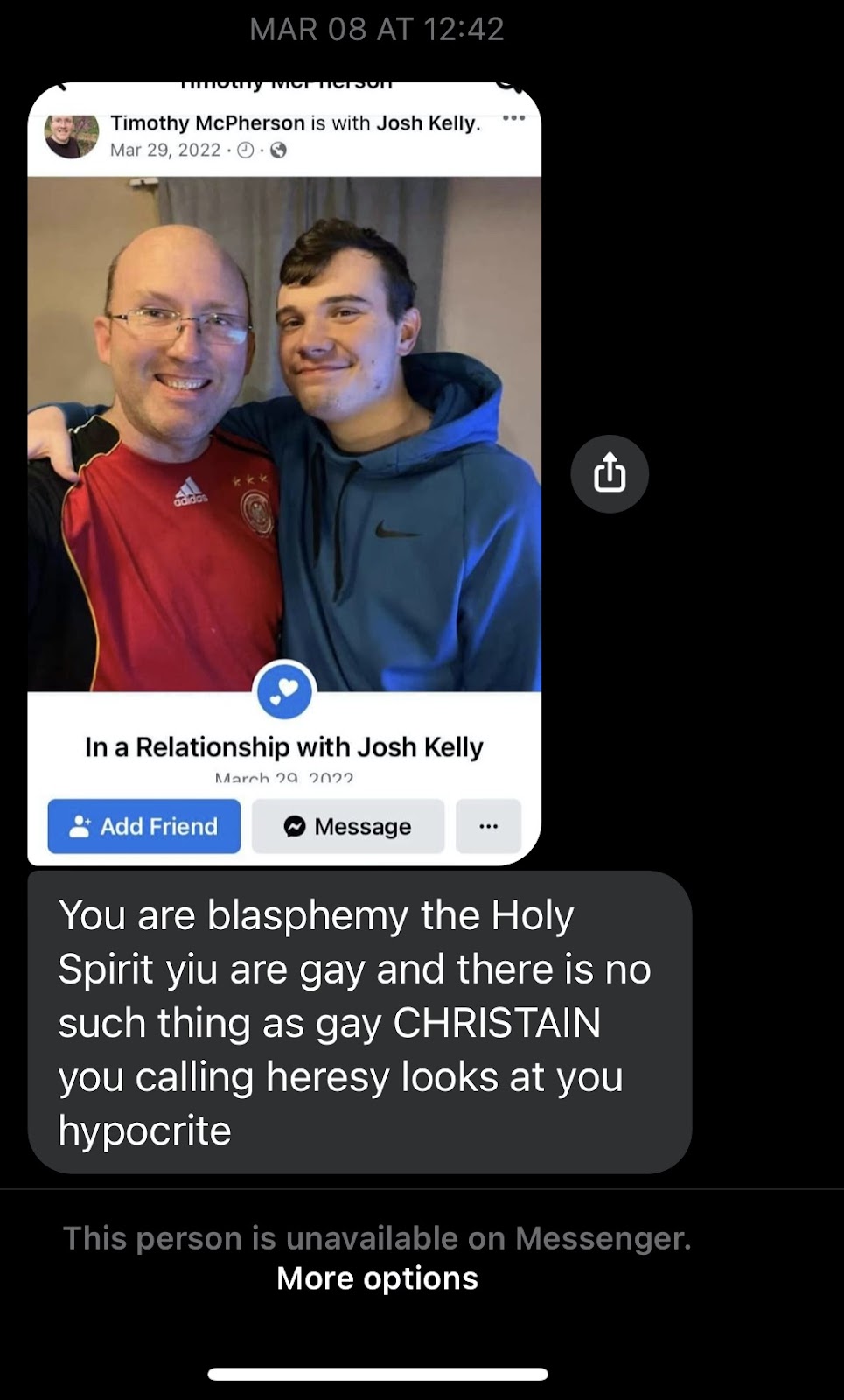This is a question that has been plaguing me for awhile.
Do I consider myself to still be a Christian? If you will: explore this question with me.
By whose definition?
This is the first question that arises for me. Who defines me as a Christian?
Not too long ago, I received an unsolicited message from someone who felt the need to interject their opinion into whether or not I am a Christian. I had publicly posted on social media that I was in a relationship with my boyfriend. This person sent me the following message (I have cropped it to not publicly identify them):
With extremely bad grammar they stated: "You are blasphemy the Holy Spirit yiu (sic) are gay and there is no such thing as gay CHRISTAIN (sic) you calling heresy looks at you hypocrite."
They promptly blocked me and it was several weeks before I even had seen the message.
I had two reactions. First, I laughed at it. Secondly, I was very sad about the message. I laughed because someone felt the need to search me out, send me a message, and then block me. Secondly, I was sad because someone felt the need to search me out, send me a message, and then block me.
Yes, I realized I repeated myself. I felt both of the things simultaneously.
It begs the question, though: who defines what a Christian is?
Doctrine is problematic.
In my old denomination, The Salvation Army, they based their beliefs on Scripture. In their first doctrine, they state emphatically:
We believe that the Scriptures of the Old and New Testament were given by inspiration of God and that they only constitute the divine rule of Christian faith and practice.
I had to memorize that. I had to recite that. In order to belong to them, I had to swear that I believed that.
Doctrine is so very contentious. I take issues with the very first doctrine. Who decided what is Scripture? The Protestant Bible looks different from the Catholic or Orthodox Bibles. Scripture wasn't even compiled until the Third Century. Even then, they weren't unified in their beliefs. When Martin Luther in the 16th Century stated that certain books in the Bible were not scripture, Catholics contradicted him and said that they were indeed part of the Bible in the Council of Trent.
Martin Luther hated the books of Hebrews, James, and Jude. He shoved them to back up the Bible, right before Revelation. In many German Bibles, they still reflect this, with these books making up the last 4 books of the Bible, unlike the rest of Protestant Bibles.
Wars have been fought over this. People have been executed for stating they were on one particular side of an issue.
I love the Bible. I love it in all of its complexity, errancy, and fallibility. However, the Bible does not state that I am a Christian. The Bible does not speak. It is silent.
Before the Bible, there were creeds.
Even before the Bible was finally compiled, one defined if they followed Christ by their Creed. The original creed was most likely the Nicene Creed. A simple Internet search will give you the text to this very beautiful creed.
These words were compiled to formulate what those who are Christians believe in. The creeds tried to describe the Trinity, the Virgin Birth, and what our relationship with God is.
I have severe doubts about the Virgin Birth. I probably couldn't recite any of the creeds with confidence. Interestingly enough, I never grew up having to learn the creeds. In The Salvation Army, they were not required to learn, except as "bonus points" if one wanted to be an "Honor Junior Soldier" or a corps cadet. (Yes, these are actual terms of junior members of their denomination.)
We have no creed, but Christ.
A couple of years ago, I was having coffee with a friend who belonged to the United Methodist Church. Having common ground with him as a former Salvationist, we talked about our beliefs. (The Methodists and The Salvation Army both have their roots in John Wesley, who was the progenitor of the Methodist Movement.) I told him how I had left The Salvation Army and now belong to the Disciples of Christ.
"Oh, you're in the Church that has no dogma! You don't believe in anything!"
I wrinkled my brow at that.
However, a grand matriarch at our church said it perhaps more eloquently: "We have no creed, but Christ."
The Church I belong to affirms that they follow Jesus. What that looks like for each individual is very different.
But am I a Christian?
Again, by whose definition? I deny the inerrancy of the Bible. That rules out most fundamentalists that I am a Christian. I deny the Virgin Birth. That rules out both Catholic and Orthodox Christians and many Protestants, too. I am in a same-sex relationship. That rules out all conservative Christian denominations.
For my church, I would say they would say this is not an issue. As my pastor told me: "You belong to us and we accompany on your faith journey, no matter what that looks like."
And for me? Do I think I am a Christian?
I know many people who have struggled with this. They abandon the concept of being a Christian because of the negative baggage it holds. They don't want to be associated with the Fundamental Evangelical Christians, who fly Confederate Flags, prefer gun rights over the lives of their children, and worship the American Nation as God's Promised Land.
I guess my answer is for myself alone. Yes, I know people might view this as a cop-out. Just as my faith evolves, so my identity evolves, too. I remember that Jesus wasn't a Christian. He was Jewish. John Wesley wasn't a Methodist. He was a priest in the Church of England.
More importantly, though: Who do you say I am?

